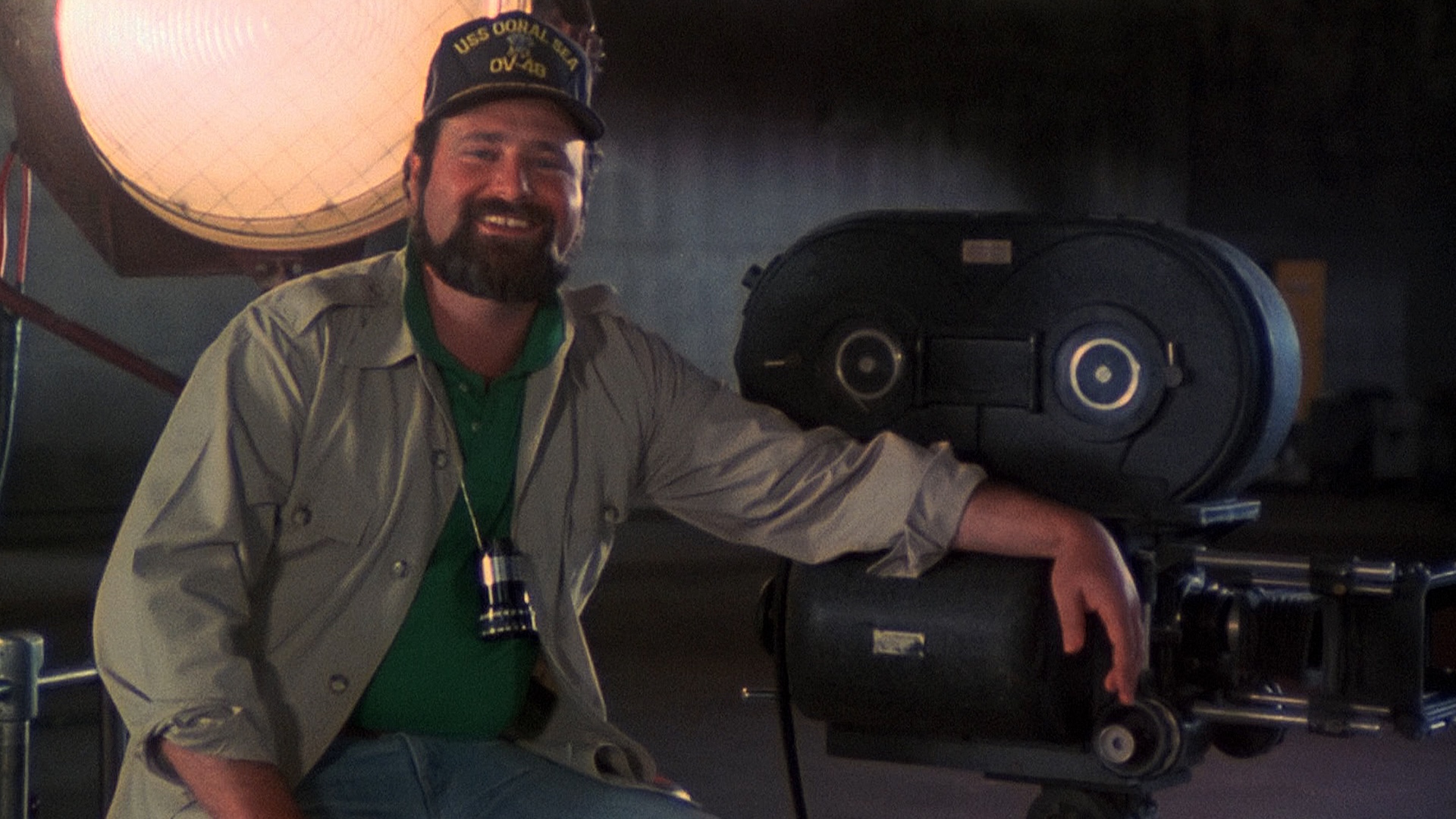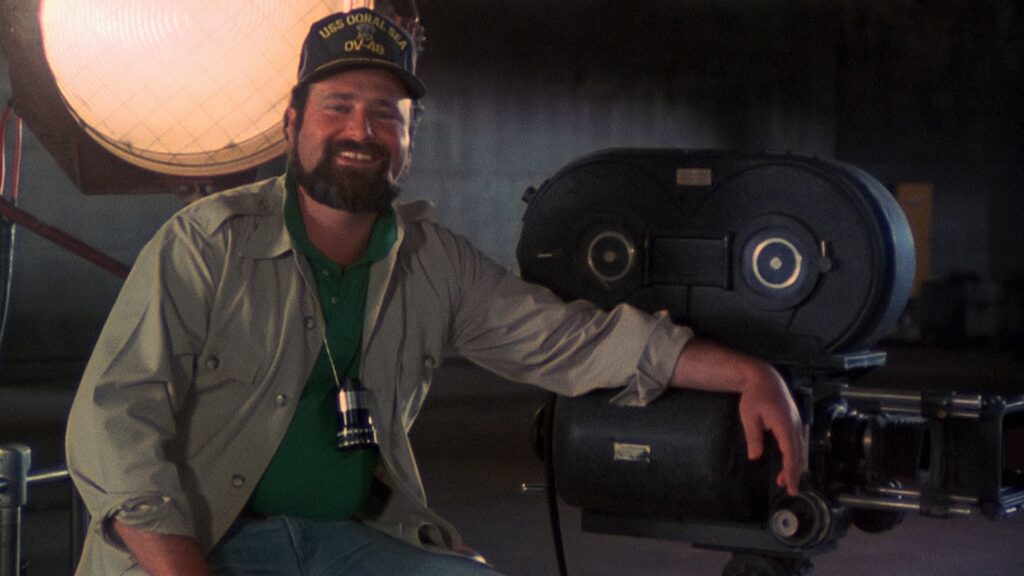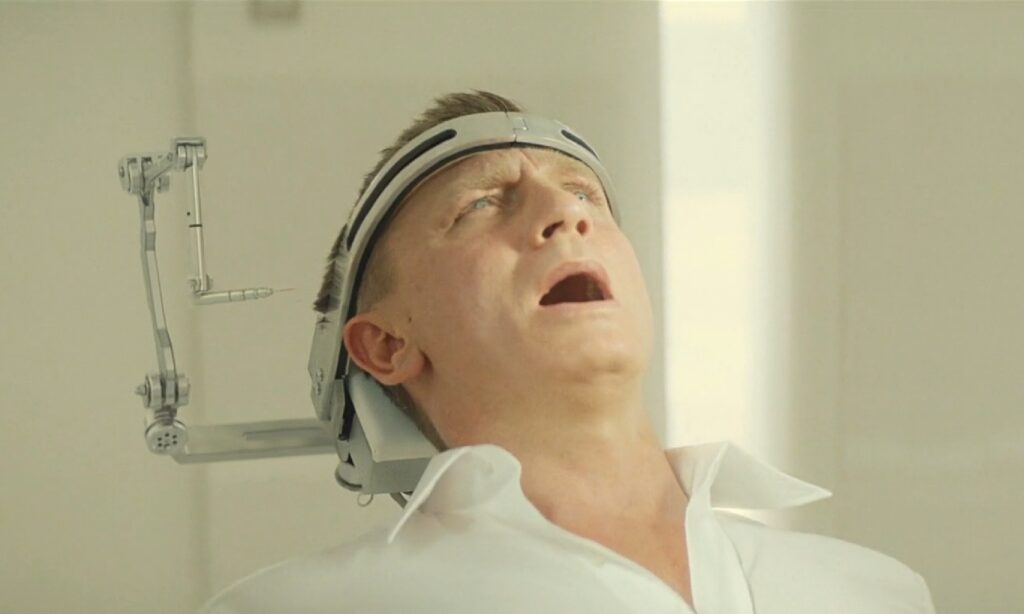A 4K restoration re-release and a long-awaited sequel to This Is Spinal Tap, a mockumentary about a very punctual band, are arriving in the nick of time. A single pierce from an amplified instrument can infuse musicians with the blood of rock and roll. Director Rob Reiner’s sonic infection took a lumbar puncture. In his 1984 full-length directorial debut, he exposed the world to Spinal Tap. Reiner, the groundbreaking director who played the fictitious fledgling filmmaker Martin Di Bergi, spoke with Den of Geek about the joys of making a movie about a fake group.
“Everybody turned it down,” Reiner tells us. “I’d been turned down by everybody.” How many now-classic rock groups made the same complaint, only to expand the boundaries of music? This Is Spinal Tap went on to change cinematic comedy, creating a new genre of improvisational mockumentary filmmaking. The heavy metal satire was deemed “culturally, historically, or aesthetically significant” by the Library of Congress, and made guitarists David St. Hubbins (Michael McKean) and Nigel Tufnel (Christopher Guest), and bassist Derek Smalls (Harry Shearer) legends in their own mythos: A fake metal group still holding the title of England’s loudest band.
From July 5 through 7 only, The Golden 41st Anniversary 4K restoration of This Is Spinal Tap will play theaters. This re-release will include a special intro from Reiner, and feature the first look anyone dares take at the upcoming sequel, Spinal Tap II: The End Continues. There is no word yet on whether the 4K restoration will replace the print in the National Film Registry. But when the first Spinal Tap riff was recorded, Reiner, the future director of The American President could not pass his agenda, no matter how loud the argument. Even armed with two Emmys for his role on All in the Family.
Norman Lear, the creator of the nationally acclaimed sitcom, saw something in the demo reel Reiner pitched in place of a screenplay. “[Embassy Pictures] the company he [Norman Lear] bought, they turned it down,” Reiner tells us. “I begged [Embassy Communications Chairman] Alan Horn to let me come in there and pitch it to him. And I did. And to Lear and [Tandem Productions President and CEO] Jerry Perenchio, and I was so crazy and angry and mad. I left the room and [Lear] apparently said to everybody else in the room, ‘who’s going to tell him he can’t do it?’ I mean, he basically trusted me. He had faith in me.”
Reiner is also a true believer. There have always been whispers that the actor best known as Mike Stivic turned to directing to avoid sitcom stereotyping. “I didn’t do it to get stopped being called Meathead because that’ll follow me the rest of my life,” Reiner laughs. “To this day, they call me that.” He made the film to face the music.
“I’m the first generation that grew up on rock and roll,” Reiner says. “So, in the ‘50s, I loved Little Richard, Chuck Berry, the Everly Brothers. There’s a list of people that I love. Then into the ‘60s, I was a big fan of Buffalo Springfield, The Doors. I loved Crosby, Stills, and Nash. I was a big fan of Janis Joplin.”
The actors inhabiting the band Spinal Tap are renowned for their commitment to musical integrity. Reiner also has a deep appreciation for the roots of rhythm. “I also was a big lover of blues. I loved Muddy Waters and Robert Johnson, and on through, even the Chicago blues. Then there’s Buddy Guy, there’s Stevie Ray Vaughan, there’s Clapton, I loved Eric, I loved Mike Bloomfield, who played with the Butterfield Blues Band and also played with a group called the Electric Flag. Most of my life, those are the things that speak to me the most.”
In This is Spinal Tap, Di Bergi discovers the band Spinal Tap playing a Greenwich Village club called the Electric Banana. The fictitious venue is set in a variation of the real location. “I was up in Haight-Ashbury in 1967, during the summer of love,” Reiner clarifies. “I went to the Fillmore, not the Fillmore East, the Fillmore. I used to see Big Brother and the Holding Company, Jefferson Airplane, Quicksilver Messenger Service, I saw all these bands.”
This is Spinal Tap was pitched to movie executives on the merits of rock and roll, drugs, and especially sex. The kids eat that up, Reiner promised in an early pitch. He’d also experienced true rock star liberation, first or second-hand.
“A friend of mine was going with Janis Joplin at the time,” Reiner says. “They had an apartment across the street from Ghirardelli Square in San Francisco. I had the distinction, and I put it at the top of my resume, of overhearing some love making between Janis Joplin and my friend. I use that as one of my big credits.”
Bands get nowhere without radio play, and Spinal Tap debuted for the most mythical of all classic disc jockeys. “Well, Wolfman Jack,” Reiner enthuses, breaking into an underplayed yet overenthusiastic impression: “Wolfman from X-E-R-B. He used to come from Tijuana. He was on a 50,000-watt station from across the border, and he boomed out everywhere. You can see him in American Graffiti.”
The elusive Wolfman Jack had a distinctive voice, perfect for platter-patter or mimicry. “I did him in The T.V. Show. This was in the late ‘78, ‘79. The show was a satire about sitcoms, TV shows, commercials. And it’s [got a parody of] Midnight Special, a late-night rock show [Wolfman hosted]. I played him introducing Spinal Tap for the first time on television. They played ‘Rock and Roll Nightmare,’ an MTV video kind of thing. That was the first time you saw Spinal Tap.”
Reiner’s gamble is like George Martin signing the Beatles to a comedy label after Decca laughed at their demo. In many ways, the Spinal Tap project was as much like starting a band as making a film. The entire project was collaborative, and every cast member was fluent in several instruments, and gifted with a natural gift for songwriting.
TV audiences probably first heard Michael McKean sing as Lenny of Lenny and the Squigtones on Laverne & Shirley. Guest played guitar as “Nigel Tufnel” on the Squigtones’ 1979 live album recorded at The Roxy in Hollywood, and on American Bandstand, but not on the series. Mentored by legendary voice actor Mel Blanc and now most beloved in multiple roles on The Simpsons, Harry Shearer came up through the Los Angeles radio comedy group, The Credibility Gap, which also included McKean.
This Is Spinal Tap created an extended cinematic improv troupe. Guest, a lifelong musician who’d performed with The National Lampoon Radio Hour and the off-Broadway revue National Lampoon’s Lemmings, directed a string of satirical mockumentary works of sublime genius, including Waiting for Guffman (1996), Best in Show (2000), and For Your Consideration (2006). His 2003 folk music sendup, A Mighty Wind, featured a trio called The Folksmen. The group was played by Guest, McKean, and Shearer.
This Is Spinal Tap’s effect remains hilarious to music fans, and terrifying to musical artists. Ozzy Osbourne doesn’t see a comedy when watching This Is Spinal Tap. He flashes back to past tours. It is hard to satirize musicians who ask what’s so funny about things that always happen when Judas Priest plays Detroit. In spite of the warnings, some bands never learn. Pearl Jam has already gone through five drummers.
Reiner directed a string of classics in every genre that audiences recite back to the screens in appreciative memory. This Is Spinal Tap is Reiner’s only film as an underground director, but he maintains the original sense of creative abandon.
“I miss just being around people who inspire you, and you collaborate, and all of a sudden something better comes out that you didn’t even imagine would happen,” Reiner says. “I love working with the guys because that’s what happens with them. But it happens with any film where you get really great creative people, and you wind up with something better than you could ever have imagined. I don’t know how to make films, except to approach them as something that is an extension of something I love, or something I can connect to myself emotionally. So, when I find those things, I go ahead and do it.
“Then, if you’re lucky, you get with people who know how to do it. I just did three episodes on The Bear. I really liked doing that because Christopher Storer, who creates it, he’s great. He creates an atmosphere very much like what we do when we make our improvised movies: He lets you be free. It’s like the best sandbox you can play in. You’re transported back to your youth. And if you work well with others and play without, and don’t stick a thing in some other kid’s eye, it can be fun.”
But not as fun as overloading a stack of Marshalls. This Is Spinal Tap finds the sweet spots of monster sounds reserved for rock gods like Led Zeppelin’s Jimmy Page. Playing the guitar with a violin is genius, but Guest pausing to tune that violin is physical comedy at 11. “Well, you have to, if you want to get the right tone,” Reiner asserts. “You can’t just take a violin and do that. It’s going to hit the wrong notes. You got to just make sure you get it right.”
Fans of the film are intimately acquainted with the band’s backstory. Nigel Tufnel and David St. Hubbins, from London’s Squatney District, merged their skiffle bands, the Creatures and the Lovely Lads into a new band called the Originals. They weren’t the original Originals and changed their names several times before charting as Spinal Tap in 1967. Derek Smalls joined shortly after. Live recordings cemented the band as a top concert act. The music business being what it is, things went sideways. The band approached Martin Di Bergi, whose backstory is less well-known.
“Marty looked at this as a tremendous opportunity for him,” Reiner explains. “The guy had been working in industrial films, and some local commercials for delis and mattress things. Spinal Tap was his favorite band, and when he got the chance to actually document them, that was like heaven to him. And he thought it would be a stepping stone to have a real career with the movie studios and get to make a movie. And he actually did.”
In Reiner’s version of Di Bergi’s backstory saga, the initial film didn’t match the Spinal Tap vision. “Even though the guys didn’t like the movie that much, they thought it was a hatchet job, he got a chance,” Reiner explains. “Because they were doing a sequel to Kramer vs. Kramer, which was a big Academy Award-winning film with Meryl Streep and Dustin Hoffman, called ‘Kramer vs. Kramer vs. Godzilla,’ and Marty got a chance to direct that. He thought that was going to be his way in. But they didn’t take to it.”
Cast back into the job pool, Di Bergi regressed. “He had to go back to doing commercials for Chuckwagon dog food and certain things,” Reiner says. “He tried to find himself. He went to a commune. The guru was a guy named Baba Ram Dass Boot. One day after meditating and having his morning spirulina smoothie, he read in Deadline Hollywood that Spinal Tap was going to reunite for one last concert. And he thought, ‘Oh my God, if I can only get a chance to do this.’ So, he put Enlightenment on hold to see if he could get that job again. And luckily, he did. And the second film comes out in September.”
Spinal Tap II: The End Continues is set long after the band’s best days, a time when some musicians, like The Smith’s Morrissey, age into conservatism or even fascism. Does any Spinal Tap member change the way they lean? “You won’t see them go MAGA in the movie,” Reiner assures us. “But you never know what happens afterward. They say something bad and they could come after you. So, I hope they stand their ground.”
The Golden 41st Anniversary 4K restoration of This Is Spinal Tap will play theaters from July 5 to 7, and Spinal Tap II: The End Continues makes a September 12 theatrical debut.
The post This Is Spinal Tap Director Rob Reiner On The Real Story of a Mockumentary Classic appeared first on Den of Geek.




